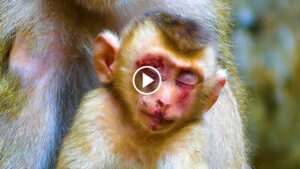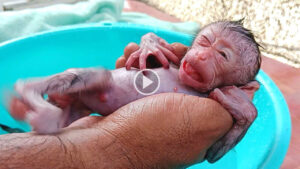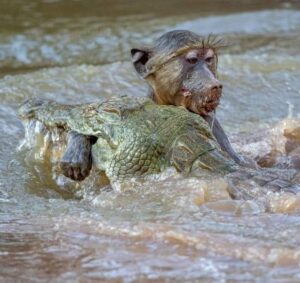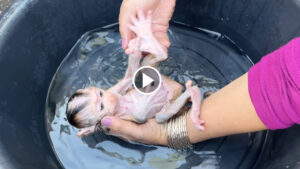Caring for a newborn baby monkey, especially when they are separated from their natural mother, can be a delicate and specialized task. Baby monkeys, like humans, need lots of attention, warmth, and proper care to thrive. Here’s a guide on how to take care of a newborn baby monkey:### 1. **Ensure Proper Warmth and Comfort**
– **Body Temperature**: Newborn baby monkeys require warmth to survive. Their body temperature can drop quickly if they aren’t kept warm. Use a heating pad or a hot water bottle wrapped in a towel to keep the baby warm, but make sure it’s not too hot.
– **Nest Setup**: Create a safe, soft, and warm environment for the baby to sleep in. Use towels or soft cloths to make a comfortable nest where the monkey feels secure.
### 2. **Feeding the Baby Monkey**
– **Formula Feeding**: If the mother monkey is unavailable, you will need to feed the baby an appropriate milk substitute. A specialized infant monkey formula is ideal, as it’s designed to mimic the nutrients they would get from their mother. **Never feed a monkey cow’s milk** or other human-based milk substitutes, as they do not provide the correct balance of nutrients.
– **Feeding Schedule**: Newborn monkeys may need to be fed every 2-4 hours, even during the night, for the first few weeks. As they grow, their feeding frequency will gradually decrease.
– **Feeding Technique**: Use a bottle with a nipple specifically designed for small animals. Make sure the milk is warm but not too hot, and always test the temperature on your wrist. Hold the baby monkey gently in your lap or in a secure position, ensuring it can drink comfortably.
– **Hydration**: In addition to milk, ensure the baby is hydrated. Some baby monkeys may need water or an electrolyte solution for hydration.
### 3. **Social and Emotional Care**
– **Attachment and Bonding**: Baby monkeys are highly social animals, and if they’re deprived of their mother’s care, they may experience emotional distress. Spend time holding and comforting the baby to help form a bond. You may need to carry the baby around or keep it close to you, especially if the baby is crying or seems distressed.
– **Comforting**: Sometimes, babies may need soothing sounds, like a soft, gentle voice or a humming noise, which can provide them with emotional reassurance. Gently stroking the monkey’s back or holding it close can mimic the comfort they would feel from their mother.
### 4. **Hygiene and Care**
– **Cleaning**: Baby monkeys may need help keeping clean, especially if they are too young to groom themselves. Use a soft, damp cloth to gently clean the monkey, especially around the face and genital areas.
– **Diapering**: If the baby is not old enough to control its bladder, you may need to use baby monkey diapers or simply clean the baby after each feeding. Be mindful to ensure the area remains dry to prevent any irritation.
### 5. **Development and Physical Care**
– **Stimulation and Exercise**: As the baby grows, it will need physical and mental stimulation. At first, they may be too small to explore much, but as they gain strength, you’ll need to provide toys or objects to help them develop coordination and motor skills.
– **Motor Skills**: Hold and gently support the monkey when it starts trying to crawl or sit up. Encourage movement and social interaction to develop strength.
### 6. **Health Monitoring**
– **Check for Signs of Illness**: Monitor the baby’s health closely. Signs of illness can include lethargy, loss of appetite, diarrhea, vomiting, or abnormal behavior. If any of these symptoms appear, seek immediate veterinary attention.
– **Veterinary Care**: Regular vet checkups are crucial, especially for vaccinations and to ensure the baby monkey is growing and developing properly. A vet will also advise you on parasite prevention, such as deworming.
### 7. **Gradual Weaning**
– **Introduction of Solid Foods**: Around 3-4 months, baby monkeys begin to eat solid foods. Gradually introduce mashed fruits, vegetables, and baby monkey food designed for their species. Be patient during this transition, as they may not initially know how to chew or swallow solid food.
– **Weaning Off Milk**: Slowly reduce the amount of milk they are given as they begin eating solid foods. By the time they reach 6 months, they should be fully weaned.
### 8. **Long-Term Care and Enrichment**
– **Socialization**: Monkeys are highly social animals. If possible, it’s best to introduce the baby to other monkeys (if available) once it is old enough, to allow it to learn social behaviors and interactions.
– **Enrichment**: As the baby grows, it will need stimulating environments to explore, like climbing structures or interactive toys. Mental stimulation is as important as physical exercise.
### Key Points to Remember:
– **Do not try to raise a monkey alone without proper knowledge or assistance from a wildlife expert or vet**. Raising a baby monkey requires dedication and the right resources, and not all species are suited to being kept as pets.
– **Consult a veterinarian** with experience in primates to guide you through the specific needs of the monkey species you are caring for.
Raising a baby monkey can be incredibly rewarding but also challenging. If you are uncertain about anything or unsure of how to proceed, seeking professional guidance is always the best option.








